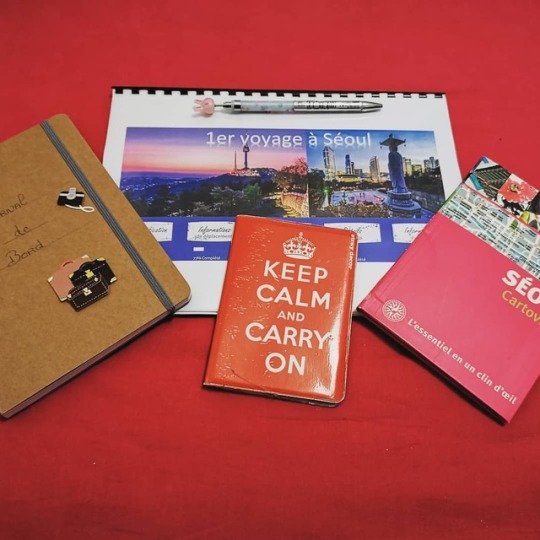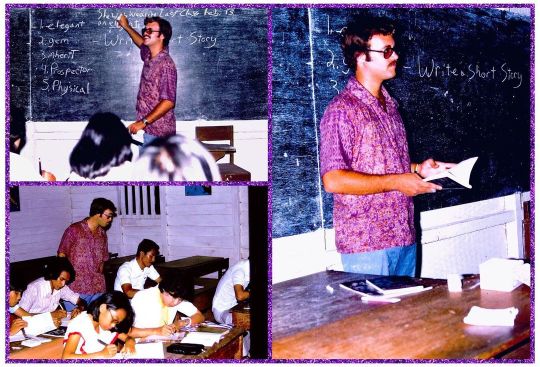#ESLEducation
Text
The Spice of English, How Dune Can Lead You Along The Golden Path Of Your Language Journey...

Frank Herbert's Dune is a masterpiece of science fiction that has captivated readers for over half a century. One of the most striking aspects of the novel is Herbert's writing style, which is both poetic and philosophical.
The Dune series is a classic work of science fiction that has captivated readers for decades. Its intricate plotlines, complex characters, and rich vocabulary make it an excellent tool for any English students looking to improve their skills while exploring the world of science fiction.
One of the key benefits of reading the Dune series is the vocabulary-building opportunities it presents. The series includes many specialised terms related to ecology, politics, religion, and science fiction, which can be challenging for students. However, by reading and analysing the story, students can build their vocabulary and expand their understanding of these topics.
In addition to building vocabulary, the Dune series can help students develop their reading comprehension skills. The complex plotlines and themes require careful analysis and interpretation, which can help students develop their critical thinking skills and improve their ability to understand and interpret complex texts.
As language learners read the Dune series, they can also practice their writing skills by summarising and analysing the story, expressing their ideas and opinions about the themes and characters, and even writing their own science fiction stories inspired by the series.
Moreover, the Dune series can allow ESL students to practice their conversation skills. As a classic work of science fiction, the series is an excellent topic for discussion, allowing students to engage in meaningful conversations with their peers or teachers and practice their speaking and listening skills.
Finally, reading the Dune series can help ESL students develop cultural literacy. The series has significantly influenced popular culture, with references to the series appearing in movies, TV shows, and other works of science fiction. By reading the Dune series, students can gain a deeper appreciation of science fiction as a genre and improve their understanding of cultural references related to the series.
In conclusion, the Dune series offers a wealth of opportunities for students to improve their English skills while exploring the world of science fiction. Through vocabulary building, reading comprehension, writing practice, conversation practice, and cultural literacy, ESL students can develop their language abilities and explore the rich themes and ideas presented in this classic work of science fiction.
So, let's embark on a journey to Arrakis and join the quest for The Spice!
Here are some English vocabulary words, phrases, and fixed expressions commonly used in the Dune series.
Vocabulary:
Ecology, is the study of living organisms and their relationships with each other and their environment.
Melange, which is the fictional drug in the Dune series, has a variety of effects on the body and mind.
Kwisatz Haderach, is a male Bene Gesserit who has access to the collective memories of his female ancestors.
The Fremen, are a group of desert nomads inhabiting the planet Arrakis.
Bene Gesserit, is an order of women with exceptional mental and physical abilities.
Guild Navigator, who is a human with mutated powers and bodies, navigates spacecraft through space because of the use of Melange and spice.
Sardaukar, which is an elite military force in the service of the Padishah Emperor.
Paul Muad'Dib, who is the main character in the series, is also known as Muad'Dib.
Phrases you need to know:
Fear is the mind-killer, which is a Bene Gesserit mantra used to overcome fear.
The spice must flow, which is a phrase used to emphasise Melange's importance to the Dune universe's economy and society.
The sleeper has awakened, which is a phrase used to indicate that someone has become aware of their true potential or destiny.
He who controls the spice controls the universe, which is a phrase used to describe the immense power and influence of the spice.
A leader, you see, is one of the things that distinguishes a mob from a people, which is a quote from the character Leto Atreides, emphasising the importance of strong leadership.
#SpeakConfidently#DuneSeries#ESLReading#ScienceFiction#EnglishLanguageLearning#VocabularyBuilding#ReadingComprehension#WritingPractice#ConversationPractice#CulturalLiteracy#ESLEducation#LanguageLearningJourney#SpiceOfLanguageLearning#ArrakisToESL#ESLStudents#DuneFans
1 note
·
View note
Video
youtube
Letter Aa Identification and Sound Mastery for Young ESL Children and Re...
0 notes
Photo

Il y a plusieurs semaines (c'est fou comme le temps passe vite) je vous annonçais que j'étais sur un petit projet. Donc à votre avis quel est ce dernier ? Je décolle demain vers Séoul pour 15 jours en famille d'accueil. J'ai réalisé ce petit voyage avec l'organisme de séjour linguistique @esl_education J'y vais avant tout pour apprendre la langue avec l'école @lexiskorea de Séoul, mais aussi pour visiter et manger pleins de bonnes choses 😋 À très vite pour le début de cette aventure 🎒✈️🇰🇷🥢📚 #voyage #coreedusud #coree #seoul #lexiskorea #esleducation #korea #sejour #apprentissage #langue #hangul #한국 #대한민국🇰🇷 https://www.instagram.com/p/Bu-t2QDglqI/?utm_source=ig_tumblr_share&igshid=psl5mk613yjs
#voyage#coreedusud#coree#seoul#lexiskorea#esleducation#korea#sejour#apprentissage#langue#hangul#한국#대한민국🇰🇷
0 notes
Link
#English#English 101#ESL#ELL#EFL#TESOL#TOEFL#IELTS#english tutor#youtubechannel#youtube#youtuber#vlog#vlogger#vloglife#Education#ESLeducation#HigherEd#university#college#high school#communication#languages#ellchat#eslchat#langchat#engchat#tumblr#Learn English Online#English Course
0 notes
Text
Peter’s Vision and Action Plan for ELL Learner’s
Vision:
My vision is for ELL learners to come to my classroom and study in an inclusive and welcoming environment. They can meet their goals of improving their level of English while also learning the curriculum content and skills.
My classroom will include modified lessons and assessments for ELL learners that consider their diverse backgrounds and tap into their interests. I will constantly reflect on biases I might have from the dominant culture to ensure I do not fall into eurocentric teaching of history. I will continually relate my history classes to current events that interest many learners, especially ESL students.
I recognize that creating an inclusive and welcoming environment for ESL students also relies on welcoming students, so I will develop ways to include all students, both non-ESL and ESL, in creating a positive classroom atmosphere. I believe that all students can understand different cultures, tolerate diversity in the classroom, and learn from one another's diverse backgrounds. I hope to create a classroom environment where students enjoy developing these skills.
Action Plan:
I assume that the ESL teacher at the school will do the initial assessment. This initial assessment will inform my planning and goal setting because I hope to help my student along the Step Process. If the student is at the lower end of the step process, I will give the student some more structured opportunities to use their language in the classroom. If the student is further along, I will still incorporate the students' first language during lessons (although I will do this less often) to build cultural appreciation and understanding.
I will focus on vocabulary development for my ESL students. All students will need to take notes, draw pictures, and write short quizzes to help them remember vocabulary. I will differentiate course readings, so they are at each ELL student's reading level. I will also provide context before we do course readings that provide students with the background and context of their work. I will draw on the wide range of cultures in the classroom by having readings and content in my course work that is diverse, (this is something I have the privilege of being able to do as a history teacher with a curriculum that is more so focused on skill development rather than teaching specific historical content for the students).
By chunking lessons and assignments, I will ensure that all students have the opportunity to excel at a high level.
My classroom will also include group work where ELL students and non-ELL students work together. Students will work in these small groups to develop all aspects of literacy skills. They will read together, actively listen, and discuss topics together as I circle the room and provide assistance. Groups will not always be the same, and for some tasks I will put ESL students together, but my priority will be to mix up groups when I can.
I can help empower ELL students by affirming their cultural and linguistic identity by having inquiry-based lessons about topics relevant to them. There are many Chinese historical resources in English that I can draw upon to relate to my lessons. In my units about Ancient Mesopotamia or Ancient Civilizations from the Americas, I will connect these units to Ancient Chinese Dynasties. When I teach my students about colonization and genocide in the Americas, I can relate this information to the Colonial power's mistreatment of China in the past. When lessons relate past historical events to the present day, I will connect these events to present-day topics in China, like the growing influence of AI, the aging population, immigration from rural areas to urban centers, discrimination against gender and progress that has been made toward gender equality, etc.
At my school, every student has access to their computer in the classroom. In the past, I told students they could not use Chinese websites as references for their research work, but now I've decided to take a different approach. I will allow my students to use Chinese sources for their research as long as they also use the same number of English sources. I can check for the reliability of sources by translating the sources students find. Students can find reliable sources in English and Chinese, and I need to teach the students how to know if their English or Chinese webpages and books are reliable. There are also good English websites based out of China that I can use for readings for my students. 6th Tone is a great resource to help me better understand Chinese Culture as a teacher. China Daily News has accessible articles about Chinese history and current events modified for English Language learners.
I will address different cultural expectations about the education system in China by using both Eastern and Western practices in my education. I will allow students to stand when they answer questions if that makes them more comfortable. I will bring in creative activities I have learned from my Educational training in the West, like Think-Pair-Shares, gallery walks, mini-debates, inquiry-based learning, but most lessons will also have a mini-lecture. The students in China are used to lectures during most of the lesson class for many Chinese courses, so having a mini-lecture in my class can help the students learn in a familiar way.
This is my vision and action plan so far. I'm sure that as I continue to learn, I will make revisions.
1 note
·
View note
Photo

Me As An ESL Teacher - 1977 Balikpapan, Kalimantan Timur, Indonesia I was really thrown into the deep end when I began my work as an ESL Teacher. A group of us, who were assigned all over Asia, met and trained for a week in Japan. Then some assistance from the Indonesian coordinators in Jakarta who then accompanied us to Balikpapan. The skill that qualified me was being a native English speaker. I used interpersonal skills including humor to really liven up the class a bit. The students were determined learners so that helped a lot. We used a 6 volume textbook that was very popular at the time. This appears to be for more advanced students. It’s really surreal to see myself being so self-assured. I know I approached the task as an adventure and was really sorry to leave when the year was up. #ESL #ESLTeacher #ESLEducator #EnglishAsASecondLanguage #BalikpapanIndonesia #Balikpapan #KalimantanTimur #1977 #WhenIWasYoung (at Balikpapan) https://www.instagram.com/p/CPUKggylvJg/?utm_medium=tumblr
#esl#eslteacher#esleducator#englishasasecondlanguage#balikpapanindonesia#balikpapan#kalimantantimur#1977#wheniwasyoung
0 notes